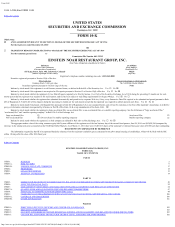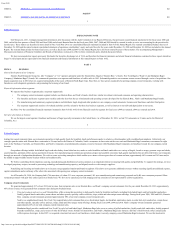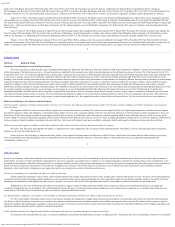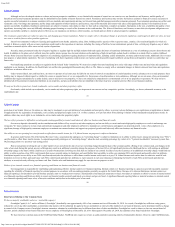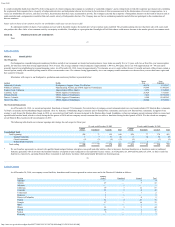Einstein Bros 2010 Annual Report Download - page 6
Download and view the complete annual report
Please find page 6 of the 2010 Einstein Bros annual report below. You can navigate through the pages in the report by either clicking on the pages listed below, or by using the keyword search tool below to find specific information within the annual report.
Form 10-K
http://www.sec.gov/Archives/edgar/data/949373/000119312511067286/d10k.htm[9/11/2014 10:09:09 AM]
security of this customer information, and our security measures may not effectively prohibit others from obtaining improper access to this information. If a person is able to circumvent our security measures, he
or she could destroy or steal valuable information or disrupt our operations. Any security breach could expose us to risks of data loss, litigation and liability and could seriously disrupt our operations and any
resulting negative publicity could significantly harm our reputation.
Unsuccessful implementation of any or all of the initiatives of our business strategy could negatively impact our operations.
Our success depends in part on our ability to understand and satisfy the needs of our guests, franchisees and licensees. Our key strategies are:
• drive comparable store sales growth;
• enhance corporate margins; and
• accelerate unit growth.
10
Table of Contents
Our ability to achieve any or all of these initiatives is uncertain. Our success in expanding sales at company-owned restaurants through various sub-initiatives including: promoting and offering value to
our customers through marketing, discounts, coupons and new menu offerings and broadening our offerings across multiple dayparts, improving our ordering and production systems, expanding our catering
program and upgrading our restaurants is dependent in part on our ability to offer value to consumers, attract new customers, predict and satisfy consumer preferences and as mentioned above, consumers’ ability
to respond positively in a challenging economic environment. Our success in growing our business through opening new company-owned restaurants is dependent on a number of factors, including our ability
to: find suitable locations, reach acceptable lease terms, have adequate capital, find acceptable contractors, obtain licenses and permits, recruit and train appropriate staff and properly manage the new restaurant.
Our success in opening new franchise and license restaurants is dependent upon, among other factors, our ability to: attract quality businesses with the interest and desire to invest/purchase in our core brands,
maintain the effectiveness of our franchise disclosure documents in target states, offer restaurant solutions for a variety of location types and the ability of our franchisees and licensees to: find suitable locations,
reach acceptable lease terms, have adequate capital, secure reasonable financing, find available contractors, obtain licenses and permits, locate and train staff appropriately and properly manage the new
restaurants. Our success in expanding our franchise business is dependent upon signing additional development agreements along with the refranchising our company-owned restaurants. If we are not successful
in implementing any or all of the initiatives of our business strategy, it could have a material adverse effect on our business, results of operations, and financial condition.
Competition in the restaurant industry is intense.
Our industry is highly competitive and there are many well-established competitors. While we operate in the fast-casual segment of the restaurant industry, we also consider restaurants in the fast-food
and full-service segments as competitors. Several fast-casual and fast-food chains are focusing more on breakfast offerings and expanding their coffee offerings. This could further increase competition in the
breakfast daypart. In addition to current competitors, one or more new major competitors with substantially greater financial, marketing and operating resources could enter the market at any time and compete
directly against us. Also, in virtually every major metropolitan area in which we operate or expect to enter, local or regional competitors already exist. This may make it more difficult to attract and retain guests
and potential franchisees and licensees.
Numerous factors including changes in consumer tastes and preferences often affect restaurants. Shifts in consumer preferences away from our type of cuisine and/or the fast-casual style could have a
material effect on our results of operations. Dietary trends, such as the consumption of food low in carbohydrate content have, in the past, and may, in the future, negatively impact our sales. Changes in our
guests’ spending habits and preferences could have a material adverse effect on our sales. Our results will depend on our ability to respond to changing consumer preferences and tastes. In addition, recent local
and state regulations mandating prominent disclosure of nutritional and calorie information may result in reduced demand for some of our products which could be viewed as containing too much fat or too many
calories.
We occupy our company-owned restaurants under long-term non-cancelable leases, and we may be unable to renew leases at the end of their lease periods or obtain new leases on acceptable terms.
We do not own any real property, and all of our company-owned restaurants are located in leased premises. Many of our current leases are non-cancelable and typically have terms ranging from five to
ten years with two three- to five-year renewal options. We believe leases that we enter into in the future likely will also be long-term and non-cancelable and have similar renewal options. Most of our leases
provide that the landlord may increase the rent over the term of the lease, and require us to pay our proportionate share of the cost of insurance, taxes, maintenance and utilities. If we close a restaurant, we
generally remain committed to perform our obligations under the applicable lease, which would include, among other things, payment of the base rent for the balance of the lease term. In some instances, we may
be unable to close an underperforming restaurant due to continuous operation clauses in our lease agreements. Our obligation to continue making rental payments in respect of leases for closed or
underperforming restaurants could have an adverse effect on our business and results of operations.
11
Table of Contents
If we are unable to renew our restaurant leases, we may be forced to close or relocate a restaurant, which could subject us to construction and other costs and risks, and could have a material adverse
effect on our business and results of operations. For example, closing a restaurant, even during the time of relocation, will reduce the sales that the restaurant would have contributed to our revenues.
Additionally, the revenue and profit, if any, generated at a relocated restaurant may not equal the revenue and profit generated at the prior location. We also face competition from both restaurants and other
retailers for suitable sites for new restaurants.
Our operations may be negatively impacted by seasonality, adverse weather conditions, natural disasters or acts of terror.
Our business is subject to seasonal fluctuations, as well as adverse weather conditions and natural disasters that may at times affect regions in which our company-owned, franchised and licensed
restaurants are located, regions that produce raw ingredients for our restaurants, or locations of our distribution network. As a result of the seasonality of our business and our industry, our quarterly and yearly
results have varied in the past, and we believe that our quarterly operating results will vary in the future. In addition, if adverse weather conditions or natural disasters such as fires and hurricanes affect our
restaurants, we could experience closures, repair and restoration costs, food spoilage, and other significant reopening costs as well as increased food costs and delayed supply shipments, any of which would
adversely affect our business. We could also experience shortages or delayed shipments at our restaurants if adverse weather or natural disasters affect our distribution network, which could adversely affect our
restaurants and our business as a whole. Additionally, during periods of extreme temperatures (either hot or cold) or precipitation, many individuals choose to stay indoors. This impacts transaction counts in our
restaurants and could adversely affect our business and results of operations.
The effects of hurricanes, fires, snowstorms, freezes and other adverse weather conditions are likely to affect supply of and costs for raw ingredients and natural resources, near-term construction costs
for our new restaurants as well as sales in our restaurants going forward. If we do not anticipate or react to changing costs of food and other raw materials by adjusting our purchasing practices or menu prices,
our operating margins would likely deteriorate.
The impact on our business from terrorism (including cyber-terrorism or efforts to tamper with food supplies) could have an adverse impact on our brand and results of operations.
We have single suppliers and vendors for many of our key products and services and the failure of any of these suppliers or vendors to perform could harm our business.
We currently purchase our raw materials from various suppliers; however, we have only one supplier for many of our key products. We purchase all of our cream cheese from a single source. Also, we
purchase a majority of our frozen bagel dough from one supplier, who uses our proprietary processes and on whom we are dependent in the short-term. All of our remaining frozen bagel dough is produced at
our dough manufacturing facility in Whittier, California or by a second supplier. Although to date we have not experienced significant difficulties with our suppliers, our reliance on a single supplier for most of
our key ingredients subjects us to a number of risks, including possible delays or interruption in supplies, diminished control over quality and a potential lack of adequate raw material capacity. Any disruption in
the supply or degradation in the quality of the materials provided by our suppliers could have a material adverse effect on our business, operating results and financial condition. In addition, any such disruptions
in supply or degradations in quality could have a long-term detrimental impact on our efforts to maintain a strong brand identity and a loyal consumer base. Additionally, we rely upon a single vendor for various
services crucial to our business operations. Any loss or disruption in these services could detrimentally impact our business.
Distribution disruptions or other distribution issues could adversely affect our business and reputation.

